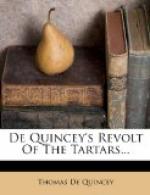as the same cause would 15 check the
advance of the Cossacks. Here, then, was the
last interval of comfort which gleamed upon the unhappy
nation during their whole migration. For ten days
the snow continued to fall with little intermission.
At the end of that time, keen, bright, frosty weather
succeeded; 20 the drifting had ceased.
In three days the smooth expanse became firm enough
to support the treading of the camels; and the flight
was recommenced. But during the halt much domestic
comfort had been enjoyed; and, for the last time,
universal plenty. The cows and oxen
25 had perished in such vast numbers on the previous
marches that an order was now issued to turn what
remained to account by slaughtering the whole, and
salting whatever part should be found to exceed the
immediate consumption. This measure led to a scene
30 of general banqueting, and even
of festivity amongst all who were not incapacitated
for joyous emotions by distress of mind, by grief
for the unhappy experience of the few last days, and
by anxiety for the too gloomy future. Seventy
thousand persons of all ages had already perished,
exclusively of the many thousand allies who had been
cut down by the Cossack sabre. And the losses
in reversion were likely to be many more. For
rumors began now to arrive from all quarters, by the
mounted couriers whom 5 the Khan had
dispatched to the rear and to each flank as well as
in advance, that large masses of the imperial troops
were converging from all parts of Central Asia to the
fords of the River Torgau, as the most convenient
point for intercepting the flying tribes; and it was
already well 10 known that a powerful
division was close in their rear, and was retarded
only by the numerous artillery which had been judged
necessary to support their operations. New motives
were thus daily arising for quickening the motions
of the wretched Kalmucks, and for exhausting
15 those who were previously but too much
exhausted.
It was not until the 2d day of February that the
Khan’s advanced guard came in sight of Ouchim,
the defile among the hills of Moulgaldchares, in which
they anticipated so bloody an opposition from the
Cossacks. 20 A pretty large body of these
light cavalry had, in fact, preoccupied the pass by
some hours; but the Khan, having two great advantages—namely,
a strong body of infantry, who had been conveyed by
sections of five on about two hundred camels, and
some pieces of light 25 artillery
which he had not yet been forced to abandon—soon
began to make a serious impression upon this unsupported
detachment; and they would probably at any rate have
retired; but, at the very moment when they were making
some dispositions in that view, Zebek-Dorchi
30 appeared upon their rear with a body of trained
riflemen, who had distinguished themselves in the
war with Turkey. These men had contrived to crawl




